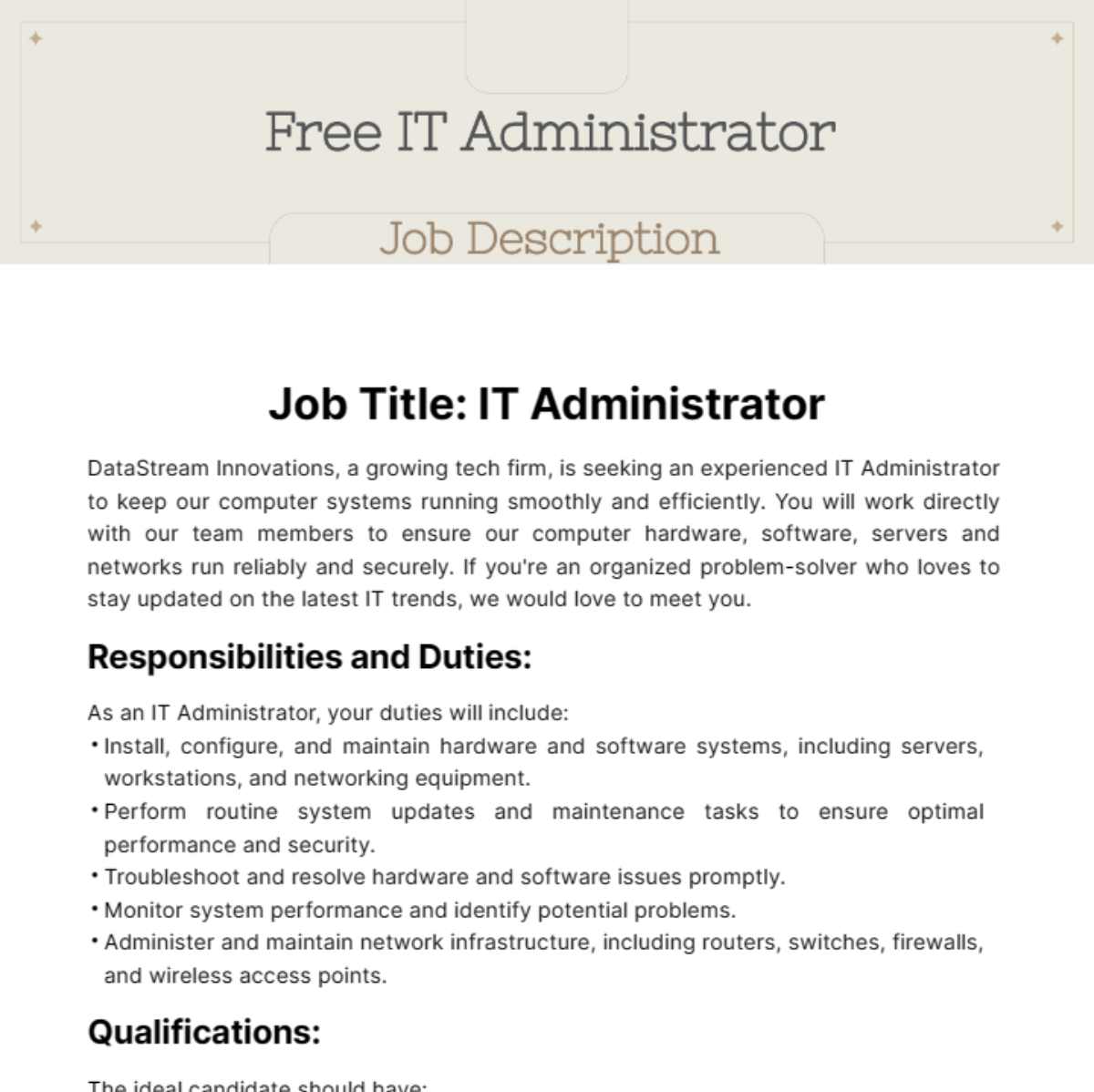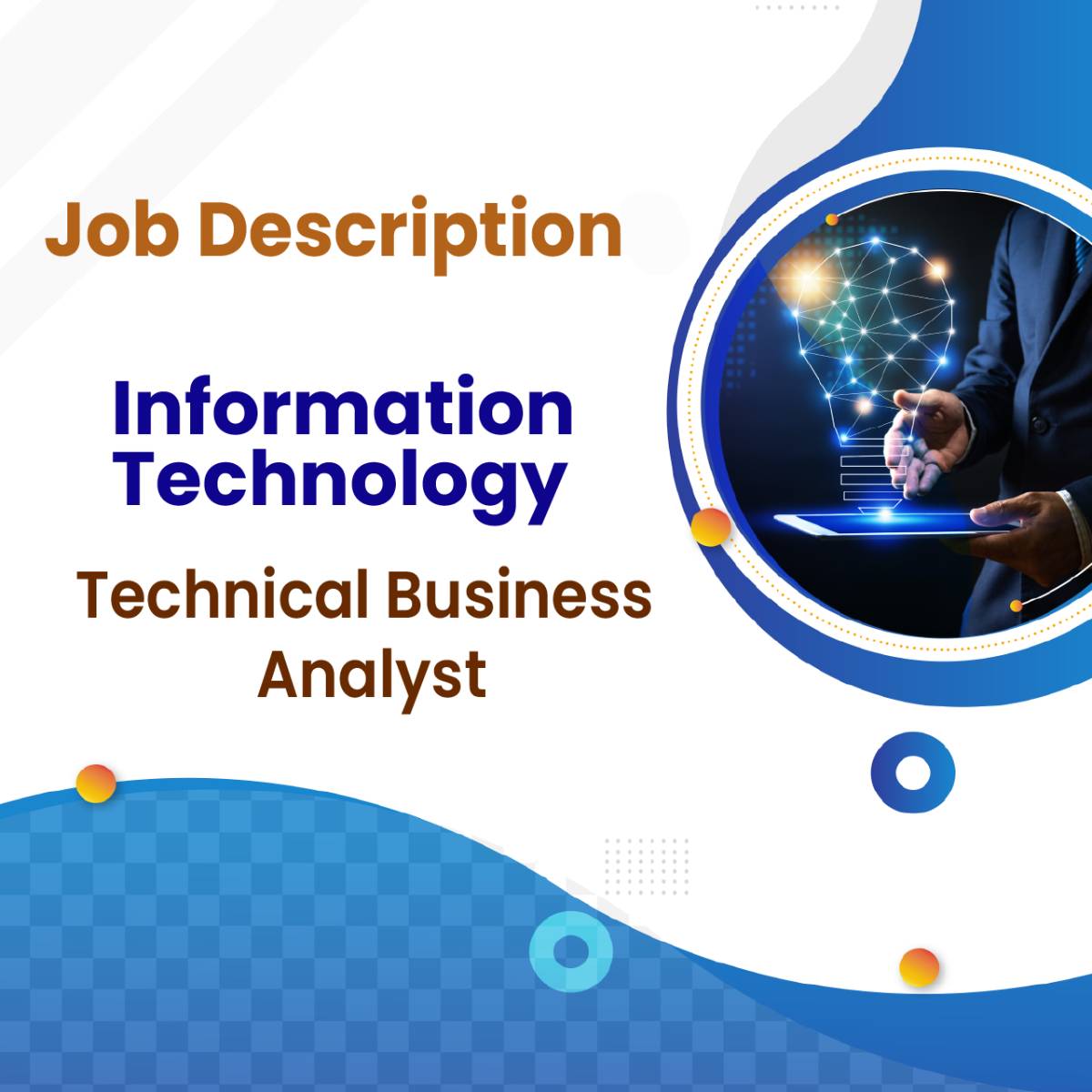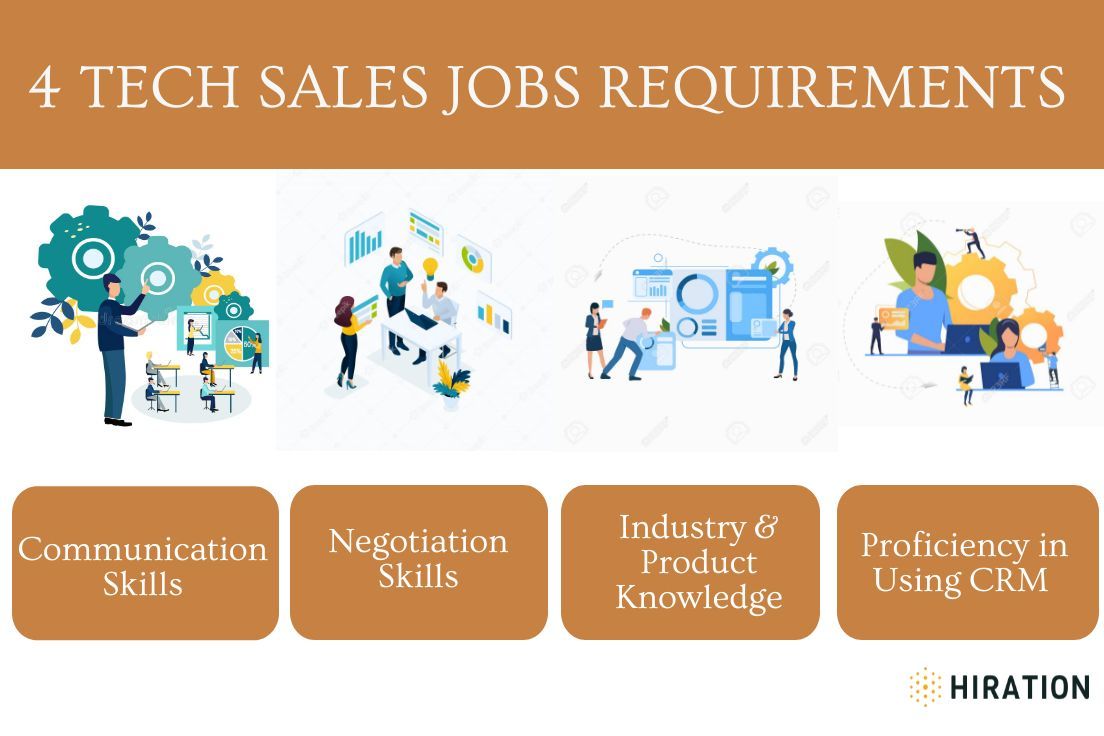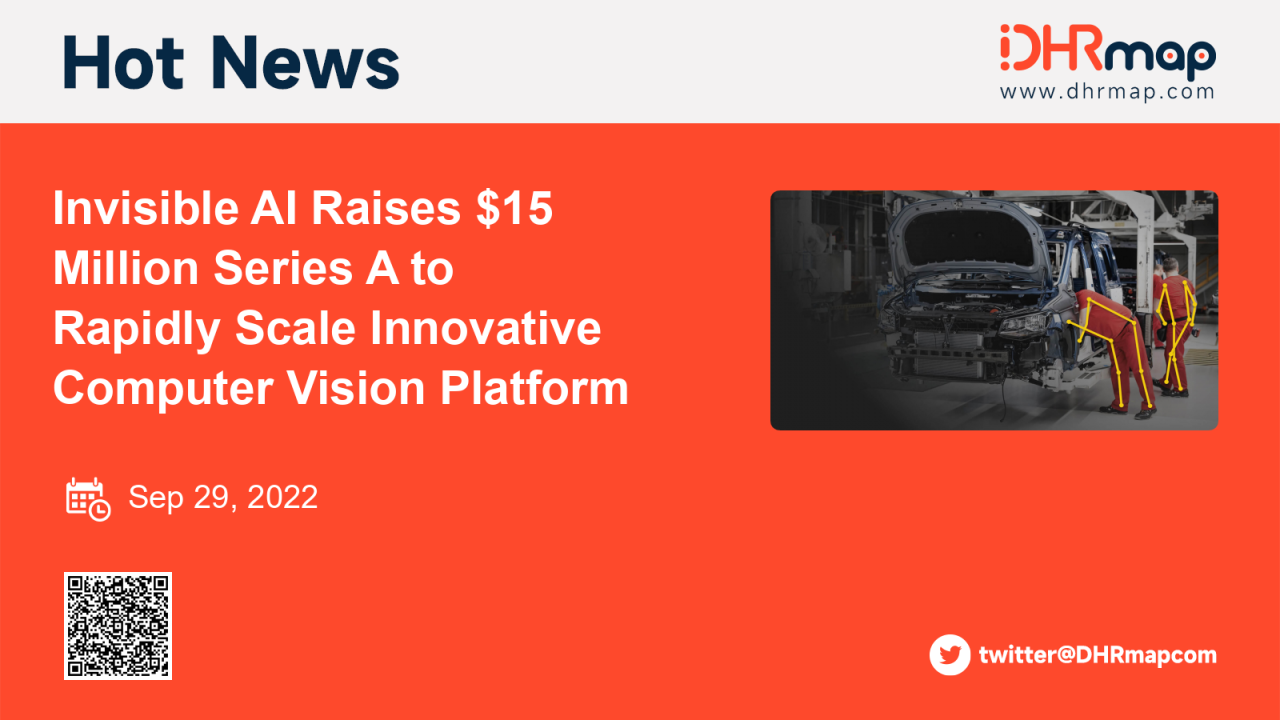Information Technology Administrator Job Description: A Comprehensive Guide
The information technology administrator job description sets the stage for this enthralling narrative, offering readers a glimpse into a world where technical prowess meets strategic thinking. IT administrators are the […]
The information technology administrator job description sets the stage for this enthralling narrative, offering readers a glimpse into a world where technical prowess meets strategic thinking. IT administrators are the unsung heroes of the digital age, ensuring seamless operation and security for businesses and organizations of all sizes.
Their work involves managing and maintaining complex IT infrastructure, from hardware and software to networks and cybersecurity. This role requires a unique blend of technical skills, problem-solving abilities, and a deep understanding of the ever-evolving technology landscape.
Job Overview
An IT administrator is responsible for the day-to-day operations of an organization’s computer systems and networks. They ensure the smooth functioning of hardware, software, and network infrastructure, supporting users and resolving technical issues.
The work environment for an IT administrator can vary depending on the size and type of organization. They may work in a traditional office setting, a data center, or even remotely. IT administrators often collaborate with other IT professionals, such as network engineers, software developers, and system analysts.
Common Software and Hardware
IT administrators use a wide range of software and hardware to perform their duties. Some common examples include:
- Operating Systems: Windows, macOS, Linux, Unix. These systems provide the foundation for running applications and managing resources.
- Network Management Tools: SolarWinds Network Performance Monitor, ManageEngine OpManager, PRTG Network Monitor. These tools help monitor network performance, troubleshoot connectivity issues, and manage network devices.
- Security Software: Symantec Endpoint Protection, McAfee AntiVirus Plus, Sophos Central. These tools protect systems from malware, viruses, and other threats.
- Virtualization Software: VMware vSphere, Microsoft Hyper-V, Citrix XenServer. These tools allow IT administrators to create and manage virtual machines, improving resource utilization and flexibility.
- Database Management Systems: MySQL, PostgreSQL, Oracle Database. These systems are used to store and manage data for applications.
- Cloud Computing Platforms: Amazon Web Services (AWS), Microsoft Azure, Google Cloud Platform (GCP). These platforms provide a wide range of services, including storage, computing, and networking, allowing IT administrators to deploy and manage applications in the cloud.
- Servers: Dell PowerEdge, HP ProLiant, Lenovo ThinkSystem. These physical servers provide the computing power and storage for applications and data.
- Network Devices: Cisco routers and switches, Juniper Networks routers and switches, Fortinet firewalls. These devices connect computers and other devices to the network and ensure secure communication.
- Desktop Computers: Dell OptiPlex, HP EliteDesk, Lenovo ThinkCentre. These computers are used by end-users to access applications and data.
- Laptops: Dell Latitude, HP EliteBook, Lenovo ThinkPad. These portable computers provide users with mobility and access to applications and data while on the go.
Essential Skills and Qualifications
The ideal candidate for this role will possess a blend of technical expertise and interpersonal skills. These qualifications ensure the efficient management and maintenance of IT systems while fostering effective communication and collaboration within the organization.
Technical Skills
Technical skills are fundamental to an IT administrator’s success. They encompass a wide range of abilities, from managing networks and servers to troubleshooting software issues.
- Operating Systems: Proficiency in managing and troubleshooting various operating systems, including Windows Server, Linux, and macOS.
- Networking: A solid understanding of networking concepts, including TCP/IP, routing, and switching, is essential for managing network infrastructure and resolving connectivity issues.
- Server Administration: Experience with server administration tasks, such as installing, configuring, and maintaining servers, is crucial for ensuring optimal performance and security.
- Database Management: Familiarity with database management systems like SQL Server, MySQL, or Oracle is valuable for managing data storage and retrieval.
- Virtualization: Knowledge of virtualization technologies, such as VMware or Hyper-V, is beneficial for managing virtualized environments and optimizing resource utilization.
- Security: A strong understanding of security principles and practices, including firewalls, intrusion detection systems, and data encryption, is essential for safeguarding IT infrastructure and sensitive data.
- Cloud Computing: Experience with cloud platforms like AWS, Azure, or Google Cloud is increasingly important for managing cloud-based applications and services.
Soft Skills
Soft skills are equally important for IT administrators, enabling them to effectively communicate with colleagues, clients, and users, as well as resolve complex technical issues.
- Communication: Excellent communication skills, both written and verbal, are crucial for explaining technical concepts to non-technical users, documenting procedures, and collaborating with team members.
- Problem-Solving: Strong analytical and problem-solving skills are essential for identifying, diagnosing, and resolving technical issues efficiently.
- Teamwork: The ability to work effectively as part of a team is essential for collaborating on projects, sharing knowledge, and providing support to colleagues.
- Time Management: Effective time management skills are vital for prioritizing tasks, meeting deadlines, and managing multiple projects simultaneously.
Certifications and Education
Relevant certifications and educational qualifications demonstrate an individual’s commitment to professional development and expertise in IT administration.
- CompTIA A+: This certification validates foundational IT knowledge and skills, including hardware, software, and operating systems.
- Microsoft Certified Solutions Expert (MCSE): MCSE certifications demonstrate expertise in specific Microsoft technologies, such as Windows Server or Azure.
- Cisco Certified Network Associate (CCNA): CCNA certifications validate knowledge of networking fundamentals and Cisco technologies.
- Bachelor’s Degree in Computer Science or a Related Field: A bachelor’s degree provides a solid foundation in IT principles and prepares individuals for a career in IT administration.
Day-to-Day Responsibilities: Information Technology Administrator Job Description

The day-to-day responsibilities of an IT administrator are multifaceted and essential for the smooth operation of any organization’s technology infrastructure. They encompass a wide range of tasks, from routine maintenance and troubleshooting to implementing new technologies and ensuring network security.
Network Security and Maintenance
IT administrators play a critical role in safeguarding an organization’s network and data. They are responsible for implementing and maintaining security measures to prevent unauthorized access, data breaches, and cyberattacks. This involves:
- Configuring and managing firewalls to block malicious traffic and control network access.
- Implementing intrusion detection and prevention systems (IDS/IPS) to monitor network activity for suspicious patterns and block potential threats.
- Regularly updating security software and operating systems to patch vulnerabilities and enhance system security.
- Conducting security audits and vulnerability assessments to identify and address potential weaknesses in the network infrastructure.
- Developing and enforcing security policies and procedures to ensure responsible and secure use of IT resources.
Troubleshooting Technical Issues and User Support
IT administrators are the first line of defense when users encounter technical problems. They troubleshoot issues with computers, software, network connectivity, and other IT systems. Their responsibilities include:
- Responding to user support requests and providing prompt assistance.
- Diagnosing and resolving technical issues through a combination of troubleshooting techniques, research, and communication with users.
- Documenting solutions and creating knowledge bases to streamline future troubleshooting efforts.
- Escalating complex issues to higher-level technical support personnel when necessary.
- Providing training and guidance to users on how to effectively utilize IT systems and resources.
Career Path and Advancement

A career as an IT administrator offers numerous opportunities for growth and advancement within the technology field. By acquiring new skills and gaining experience, IT administrators can progress into more specialized roles and leadership positions.
Paths to Advancement
IT administrators can advance their careers by specializing in specific areas of IT, taking on leadership roles, or pursuing certifications that demonstrate their expertise.
- Specialization: IT administrators can specialize in areas such as network administration, cybersecurity, cloud computing, or database administration. This involves developing in-depth knowledge and skills in a specific technology domain. For example, a network administrator might specialize in network security, while a cloud administrator might focus on cloud security and management.
- Leadership Roles: As IT administrators gain experience and demonstrate strong leadership qualities, they can progress to roles such as IT manager, team leader, or director. These roles involve overseeing teams of IT professionals, managing budgets, and making strategic decisions about technology investments.
- Certifications: Obtaining industry-recognized certifications can enhance an IT administrator’s credibility and demonstrate their expertise in specific technologies. Some popular certifications for IT administrators include CompTIA A+, Network+, Security+, Microsoft Certified Solutions Associate (MCSA), and Cisco Certified Network Associate (CCNA).
Examples of Specialized Roles
Here are some examples of specialized roles that IT administrators can pursue:
- Systems Administrator: Responsible for managing and maintaining the operating systems, hardware, and software of computer systems.
- Network Administrator: Manages and maintains the network infrastructure, including routers, switches, firewalls, and network security.
- Database Administrator: Manages and maintains databases, ensuring data integrity, security, and performance.
- Security Administrator: Responsible for implementing and maintaining security measures to protect computer systems and networks from threats.
- Cloud Administrator: Manages and maintains cloud computing services, including infrastructure, platforms, and applications.
Industry Trends and Future Outlook
The IT administrator role is constantly evolving, driven by technological advancements and shifting business demands. Understanding these trends is crucial for aspiring IT professionals to stay ahead of the curve and build a successful career.
The growing adoption of cloud computing, automation, and artificial intelligence is transforming the IT landscape. This transformation presents both challenges and opportunities for IT administrators, requiring them to adapt and acquire new skills.
Demand for Specialized Skills
The demand for IT professionals with specific skills is on the rise. This is due to the increasing complexity of IT systems and the need for specialized expertise in areas like cybersecurity, cloud computing, and data management.
Here are some of the most sought-after skills in the IT administration field:
- Cloud Computing: Proficiency in cloud platforms like AWS, Azure, and Google Cloud is highly valued, as organizations are increasingly migrating their IT infrastructure to the cloud.
- Cybersecurity: With cyber threats becoming more sophisticated, IT administrators with strong cybersecurity skills are in high demand. This includes knowledge of security best practices, intrusion detection and prevention systems, and incident response.
- Data Management: As organizations generate vast amounts of data, IT administrators with expertise in data management, including database administration, data analytics, and data security, are highly sought after.
- Automation: IT automation tools and techniques are becoming increasingly popular, enabling IT administrators to streamline tasks and improve efficiency. Skills in scripting languages like Python and PowerShell are highly valuable in this area.
Emerging Technologies, Information technology administrator job description
Emerging technologies are constantly reshaping the IT landscape, presenting new challenges and opportunities for IT administrators.
- Artificial Intelligence (AI): AI is rapidly transforming IT operations, automating tasks, improving security, and providing insights from data. IT administrators will need to understand and adapt to these AI-powered tools and technologies.
- Edge Computing: Edge computing is decentralizing data processing and storage, bringing computing resources closer to users and devices. This trend will require IT administrators to manage and secure distributed IT environments.
- Internet of Things (IoT): The increasing number of connected devices and sensors is creating a vast network of data that needs to be managed and secured. IT administrators will play a crucial role in managing and securing these IoT environments.
Final Thoughts
In conclusion, the information technology administrator job description paints a vivid picture of a demanding yet rewarding career path. IT administrators play a vital role in shaping the future of technology, ensuring that businesses can leverage its power to thrive. As technology continues to evolve at a rapid pace, the demand for skilled and adaptable IT professionals will only grow stronger, making this a field with immense potential for growth and innovation.
An Information Technology administrator’s job description often involves ensuring the smooth operation of systems and networks, but it can also extend to implementing and maintaining quality control measures. This might include integrating tools and processes for data integrity, security, and performance monitoring.
Understanding the role of technology in quality control is crucial for IT administrators, as it allows them to contribute to overall business efficiency and reliability.










